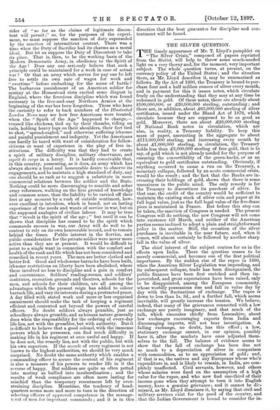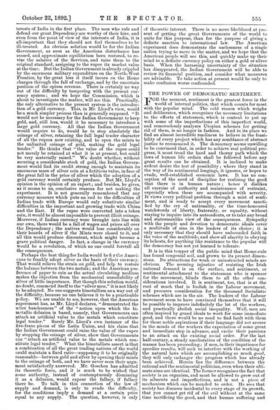THE SILVER QUESTION. T HE timely appearance of Mr. T. Lloyd's
pamphlet on "The Silver Crisis," composed of papers reprinted from the Statist, will help to throw some much-needed light on a very thorny and, for the moment, very important subject. The whole question turns, at present, on the currency policy of the United States ; and the situation there, as Mr. Lloyd describes it, may be summarised as follows. By the Act of 1890, the Treasury is bound to pur- chase four and a half million ounces of silver every month, and in payment for this it issues notes, which circulate freely on the understanding that they may at any time be redeemed in gold. Of these notes, there are already about $100,000,000, or £20,000,000 sterling, outstanding ; and there are, in addition, about £65,000,000 sterling of silver certificates, issued under the Bland Act of 1878, which circulate because they are supposed to be as good as gold. Moreover, there are about £28,000,000 sterling of National Bank notes in circulation, which are also, in reality, a Treasury liability. To keep this mass of paper, amounting in the aggregate to about £113,000,000 sterling, and increasing every month by about £1,000,000 sterling, in circulation, the Treasury holds less than £3,000,000 sterling of free gold, that is to say, of gold which is not already needed for the purpose of ensuring the convertibility of the green-backs, or as an equivalent to gold certificates outstanding. Obviously, if anything occurred to cause a run on the Treasury, a monetary collapse, followed by an acute commercial crisis, would be the result ; and the fact that the Banks are in- creasing their holdings of gold, shows that there is some uneasiness in the public mind. The only remedy is for the Treasury to discontinue its purchase of silver. In that case, the credit of the country would be sufficient to maintain the existing stock of silver coin and paper at its full legal value, just as the full legal value of the five-franc piece is maintained in France. But before this step can be taken, the sanction of Congress is needed. The present Congress will do nothing, the new Congress will not come into existence till March, and neither of the American parties seems inclined to adopt a plain and straightforward policy in the matter. Still, the cessation of the silver purchases is inevitable in the near future, and, when it comes, will almost certainly be followed by another sharp fall in the value of silver.
The chief interest of the subject centres for us in the effects upon India. There the question ceases to be merely commercial, and becomes one of the first political importance. By the sudden rise of the rupee in 1890, when the American Silver Legislation was impending, and its subsequent collapse, trade has been disorganised, the public finances have been first enriched and then im- poverished, and great expectations have been raised, only to be disappointed, among the European community, whose worldly possessions rise and fall in value day by day with the fluctuations of exchange. The rupee is down to less than is. 3d., and a further fall, which seems inevitable, will greatly increase the tension. We believe, indeed, that many of the grievances connected with a low exchange are purely imaginary, and that much of the talk, which emanates chiefly from Lancashire, about low exchanges encouraging exports from India and discouraging imports, will not bear investigation. A falling exchange, no doubt, has this effect ; a low, stationary exchange cannot, in our opinion, possibly have it, after the markets have once adjusted them- selves to the fall. The balance of evidence seems to show that the fall of exchange has been due not so much to a depreciation of silver in comparison with commodities, as to an appreciation of gold ; and, if that is so, the natives and any Europeans whose who!e expenditure is, and is likely to remain, in India, are com- pletely unaffected. Civil servants, however, and others whose salaries were fixed on the assumption of a high value for the rupee, and who now find one-third of their income gone when they attempt to turn it into English money, have a genuine grievance ; and it cannot be die- missed, as Mr. Lloyd dismisses it, by saying that civil and military services exist for the good of the country, and that the Indian Government is bound to consider the in- terests of India in the first place. The men who rule and defend our great Dependency are worthy of their hire, and even from the point of view of the interests of India, it is all-important that they should not feel themselves to be ill-treated. An obvious solution would be for the Indian Government, as soon as the American disturbance has ceased, and approximate equilibrium been restored, to re- vise the salaries of the Services, and raise them to the original standard, assigning to the rupee its market value at the time. But the Indian Government is already crippled by the enormous military expenditure on the North-West Frontier, by the great loss it itself incurs on the Home charges through the fall of exchange, and by the uncertain position of the opium revenue. There is certainly no way out of the difficulty by tampering with the present cur- rency system ; and we hope the Commission, which is about to investigate the matter, will see this. Practically, the only alternative to the present system is the introduc- tion of a gold currency. This, in Mr. Lloyd's view, would be a much simpler process than is generally supposed. "It would not be necessary for the Indian Government to keep gold, and, still less, would it be necessary to introduce a large gold currency. All that the Indian Government would require to do, would be to stop absolutely the coinage of silver, retaining the full legal tender character of all the rupees now existing, and to open the mints to the unlimited coinage of gold, making the gold legal tender." He thinks that "the value of the rupee could not merely be retained at what it is at present, but could be very materially raised." We doubt whether, without securing a considerable stock of gold, the Indian Govern- ment would find its credit strong enough to maintain its enormous mass of silver coin at a fictitious value, in face of the great fall in the price of silver which the adoption of a gold currency would certainly produce. But Mr. Lloyd's opinion is the opinion of an expert ; and besides, he gives, as it seems to us, conclusive reasons for not making the experiment. It is not generally remembered that any currency measure which puts an end to the difficulties of Indian trade with Europe would only substitute similar difficulties in the important and growing trade with China and the East. If the rupee were converted into a token coin, it would be almost impossible to prevent illicit coinage. Moreover, if Indian currency were brought into line with our own, there would be a fall of wages and prices all over the Dependency ; the natives would lose considerably on their hoards of silver if the Mints were closed to it, and all this would produce discontent, which might become a grave political danger. In fact, a change in the currency would be a revolution, of which no one could foretell all the consequences. Perhaps the best thing for India would be fi r the Ameri- cans to frankly adopt silver as the basis of their currency. That would relieve the strain on gold, and help to restore the balance between the two metals ; and the American pre- ference of paper to coin as the actual circulating 'medium makes the objection from the mechanical unsuitability of silver of little importance. But though this solution would, no doubt, commend itself to the "silver men," it is not likely to be adopted. No one suggests bimetallism as a way out of the difficulty, because no one believes it to be a practicable policy. We are unable to see, however, that the American experiment has, as Mr. Lloyd declares, "demonstrated the utter baselessness " of the "notion upon which the bi- metallic delusion is based, namely, that Governments can attach an artificial value to the metals which constitute legal tender." Surely Mr. Lloyd's own instance of the five-franc pieces of the Latin Union, and his claim that the Indian Government could raise the value of the rupee by stopping the coinage of silver, show that Governments can "attach an artificial value to the metals which con- stitute legal tender." What the bimetallists assert is that a combination of all the great trading nations of the world could maintain a fixed ratio—supposing it to be originally reasonable—between gold and silver by opening their mints to the coinage of both, and we have never seen their argu- ment satisfactorily answered. Mr. Goschen has admitted its theoretic force, and it is much to be wished that some authority, instead of contemptuously dismissing it as a delusion, would expose the fallacy, if fallacy there be. To talk in this connection of the law of supply and demand, is only to evade the difficulty, for the conditions imply a demand at a certain price equal to any supply. The question, however, is only of theoretic interest. There is no more likelihood at pre- sent of getting the great Governments of the world to unite for this purpose, than for the purpose of giving a definite sanction to international law. The American experiment does demonstrate the uselessness of a single nation trying to move in the matter, and we hope that the American people will see this, and quickly make up their mind to a definite currency policy on either a gold or silver basis. When the harassing uncertainty of the situation has disappeared, the Indian Government will be able to review its financial position, and consider what measures are advisable. To take action at present would be only to make confusion worse confounded.







































 Previous page
Previous page